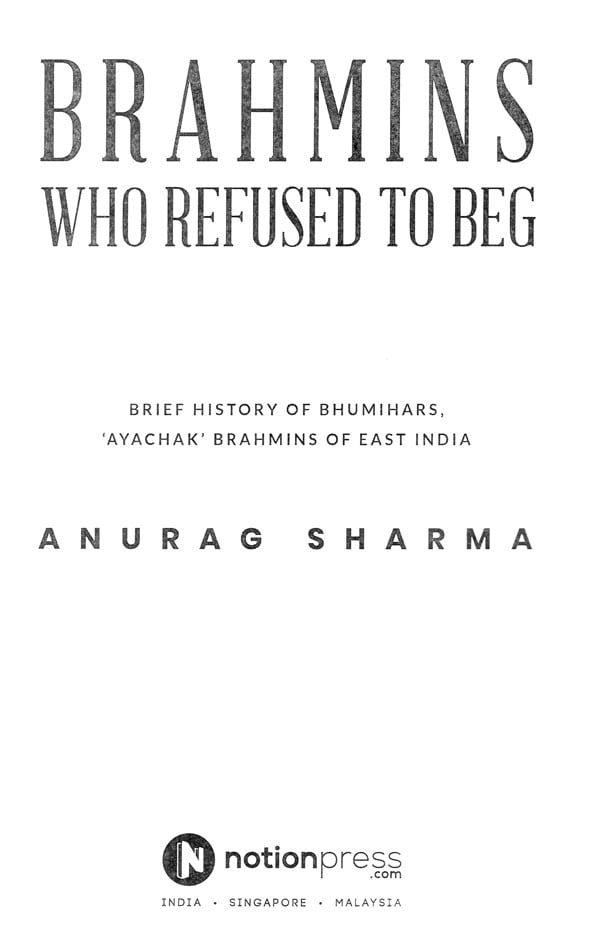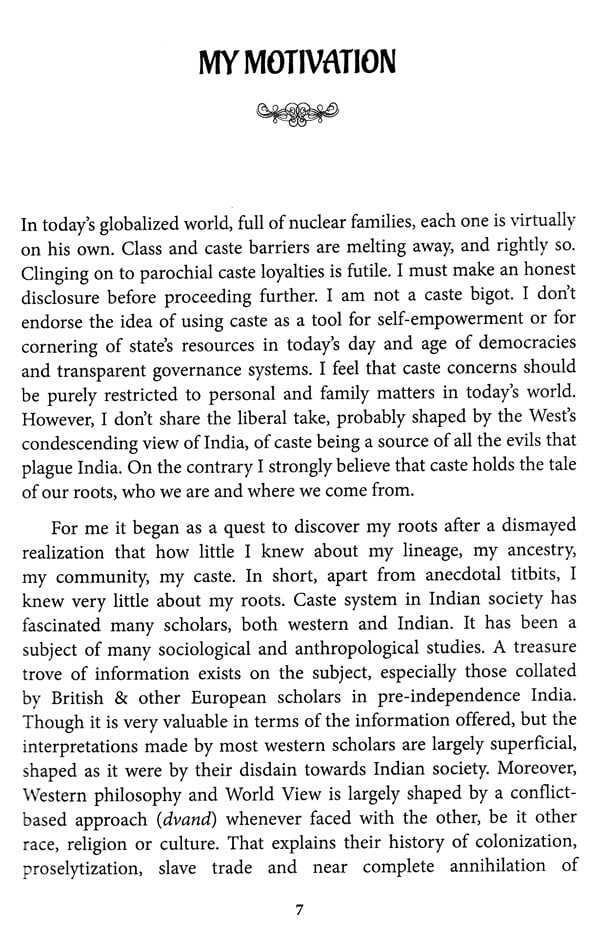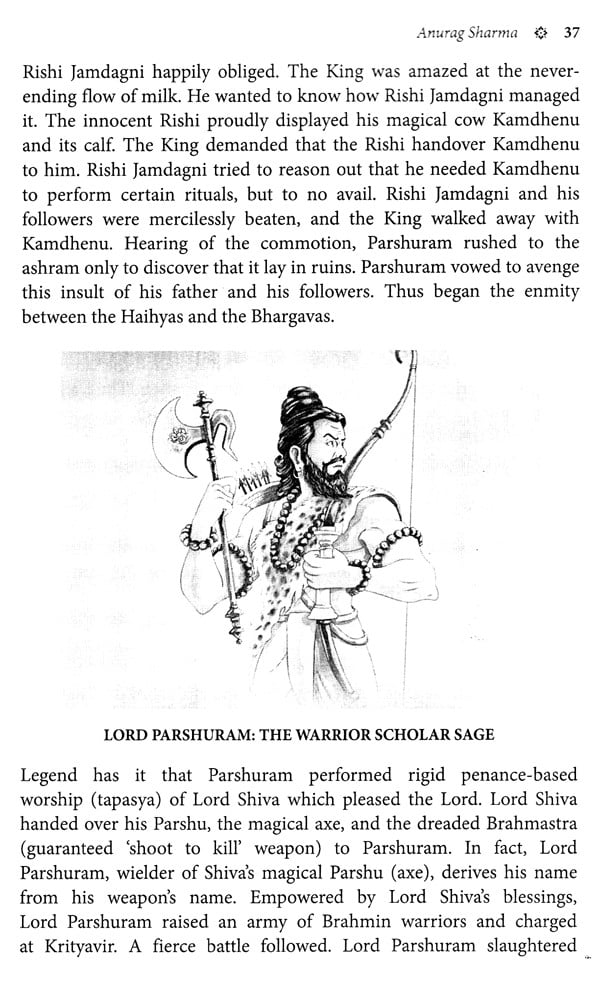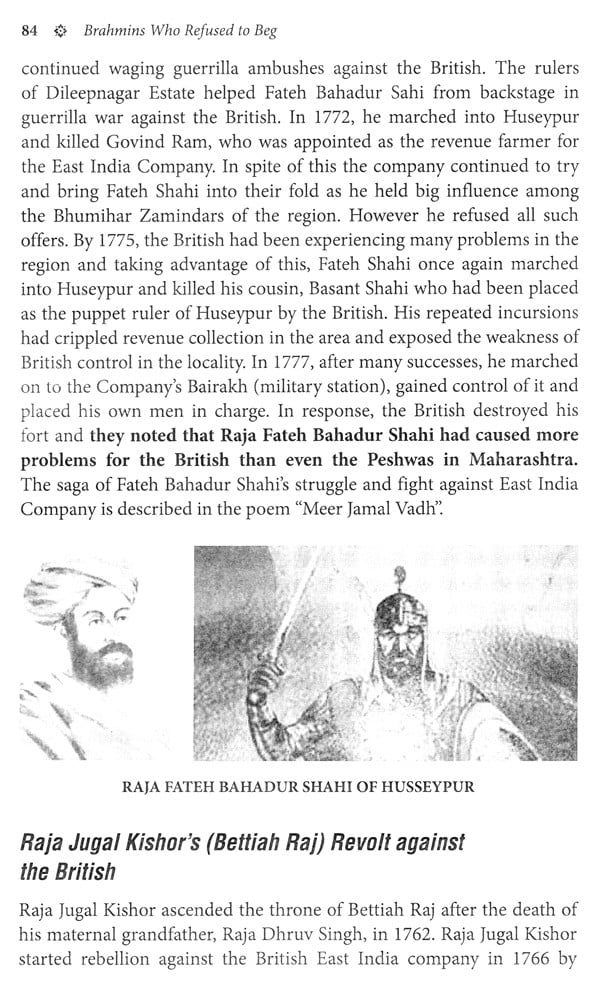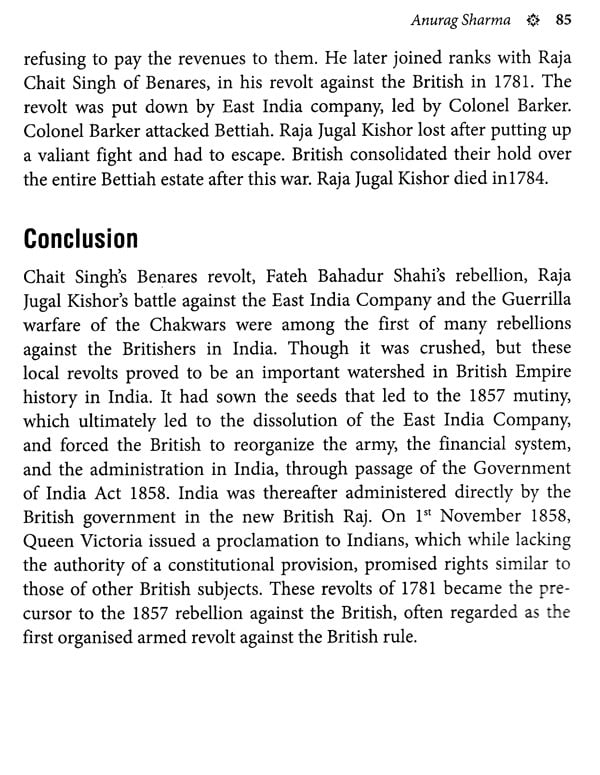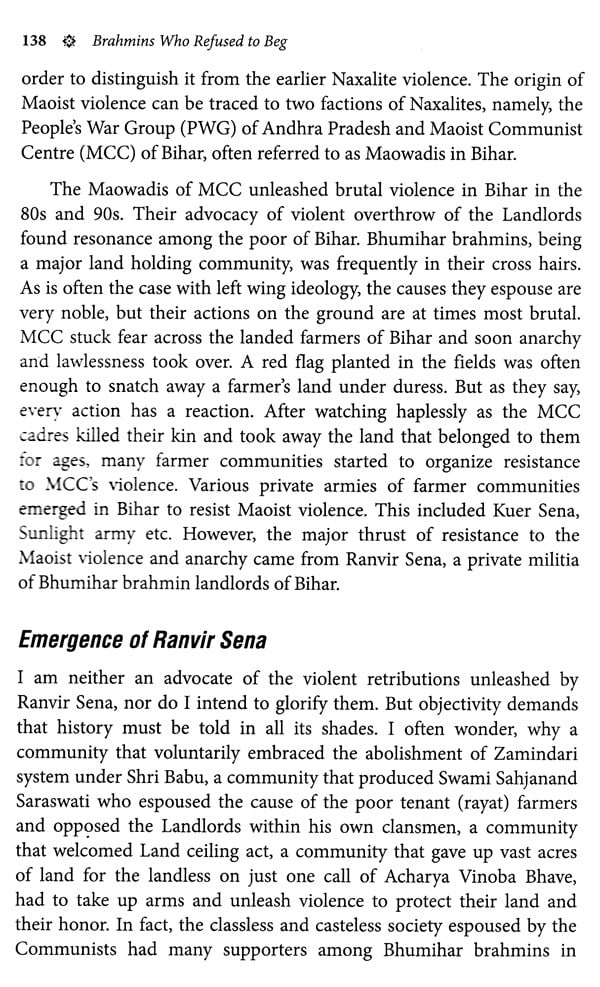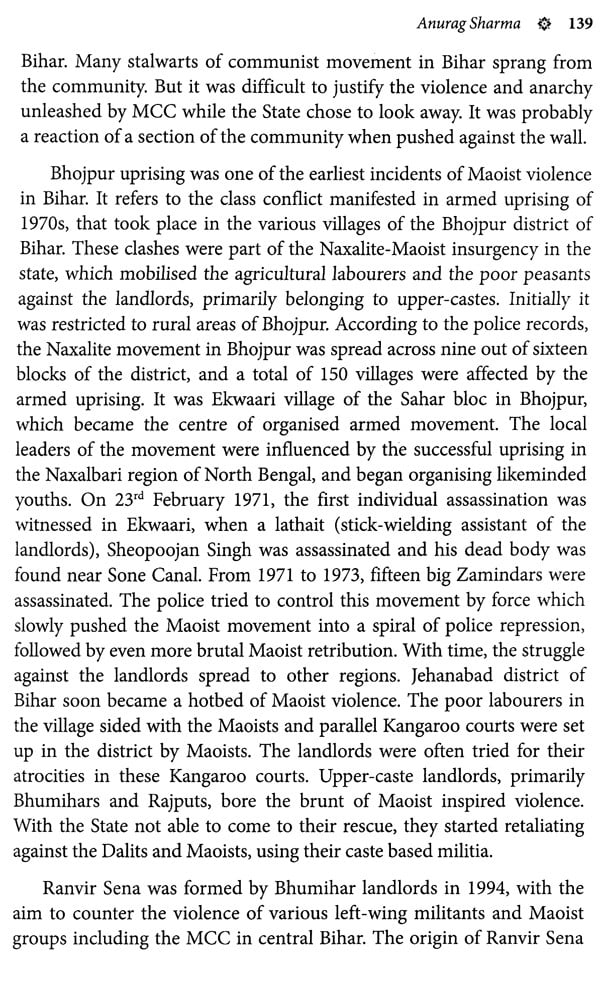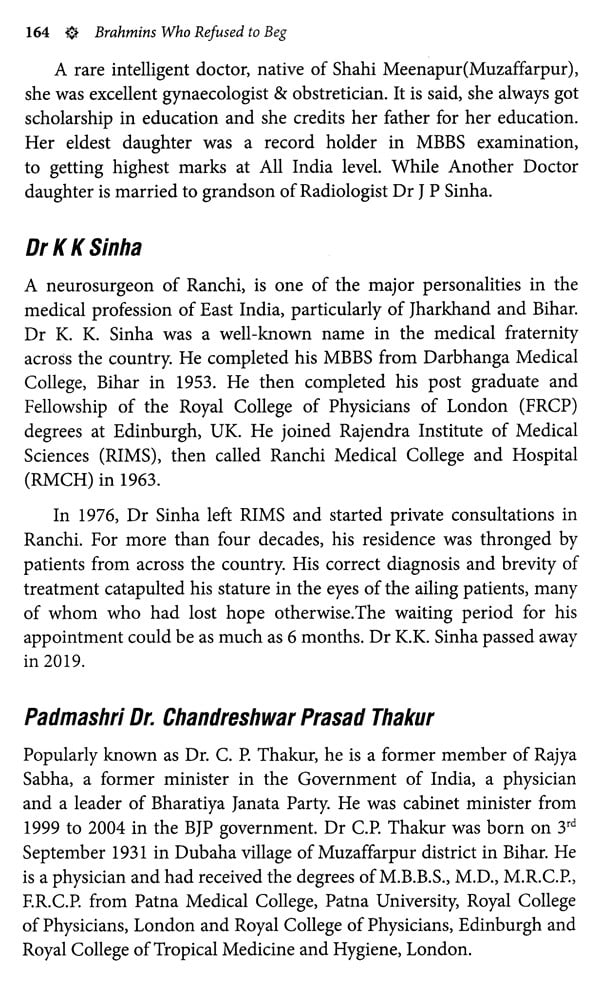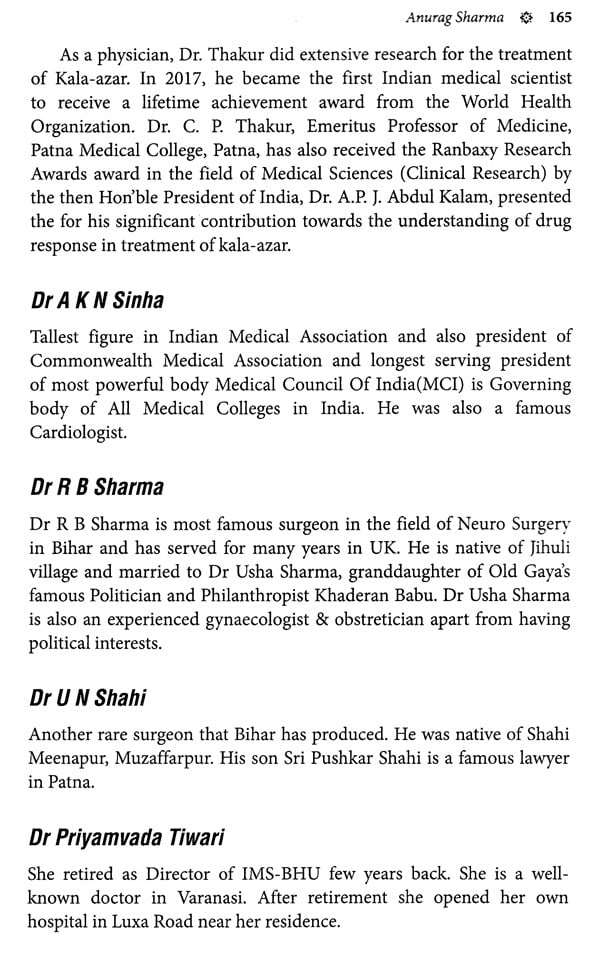
Brahmins Who Refused to Beg (Brief History of Bhumihars, 'Ayachak' Brahmins of East India)
Book Specification
| Item Code: | UBF207 |
| Author: | Anurag Sharma |
| Publisher: | Notion Press |
| Language: | English |
| Edition: | 2022 |
| ISBN: | 9798888333709 |
| Pages: | 188 (Throughout B/w Illustrations) |
| Cover: | PAPERBACK |
| Other Details | 9.00 X 6.00 inch |
| Weight | 250 gm |
Book Description
Bhumihars are a prominent Ayachak brahmin community of East India. Ayachak brahmins gave up priestly duties and took up agriculture for subsistence and bore arms to protect the motherland. Ayachaks have coexisted alongside the traditional priestly Yachak class. within the Brahminical fold across India since time immemorial Bhumihar brahmin community, though small, has a rich history of both valour and scholarship. Even as the Greeks, led by Alexander the Great, were ravaging the north-western flanks of India. a Chanakya was plotting a quiet pushback. When the successors of King Ashoka, smitten by the non-violent ways of Buddhism, were dilly dallying against the imminent threat of a Greek resurgence, a Pushyamitra Shunga rose to shake the warriors out of their stupor of non-violence and pushed back the Greeks beyond the borders of Bharat forever. When forced to use a rifle cartridge laden with beef starch, against their Hindu beliefs, a Mangal Pandey became the first one to rise in protest and soon a nation followed. The indomitable spirit of the community has inspired and dazzled with their scholarship as well. Ramdhari Singh Dinkar's pen, drenched in the patriotic fervour of 'Veer Rasa', inspired many mutinies against the British. From the venerable Shri Babu, the first chief minister of Bihar in independent India, to Raj Narain, the giant killer who defeated Indira Gandhi, the community has shone in the field of politics and leadership. The community has not shied away from raising its voice against injustice and led reform movements like abolition of Zamindari and the temple entry movement. They may have lost their traditional tools of subsistence, but they still carry the twin endowments of bravery and intellect in their genes. Bhumihar Ayachak' brahmins are truly the brahmins who refused to beg.
Anurag Sharma, a Petroleum Engineering graduate from IIT-ISM Dhanbad, is an Oil & Gas professional who has worked in various Oil companies, both in India and abroad. A native of Jihuli village in East Champaran, he has keen interest in digging deeper about his roots. That quest led him to do research on Bhumihar brahmins of East India. As the information docket swelled, he felt an urge to share the brief history of his community in a book form with others. This book is the fruit of his research to rediscover his community roots.
Sometimes ordinary folks end up accomplishing extraordinary feats. Feats which often turn the tide of history forever. Though these men may be relegated to the footnotes of history, but one often marvels at what pushed those seemingly ordinary men to perform extra-ordinary tasks. Let's take a quick look at the tales of two such men who turned the tide of the Indian independence struggle against the British forever.
Mangal Pandey: Catalyst Who Ignited 1857 Revolt
Mangal Pandey was an Indian soldier in the army of the British East India Company. He played a key part in the events immediately preceding the outbreak of the Indian rebellion of 1857. He was a sepoy in the 34 Bengal Native Infantry (BNI) regiment of the British East India Company. On the afternoon of 29th March 1857, Lieutenant Baugh, Adjutant of the 34th Bengal Native Infantry, then stationed at Barrackpore, was informed that several men of his regiment were in an excited state. Further, it was reported to him that one of them, Mangal Pandey, was pacing in front of the regiment's guard room near the parade ground, armed with a loaded musket, calling upon the men to rebel and threatening to shoot the first European that he set his eyes on. Baugh soon accosted Pandey but he was attacked and grievously injured by Pandey. Later a British Sergeant-Major named Hewson charged towards Pandey as he was fighting with Lieutenant Baugh. While confronting Pandey, Hewson was knocked to the ground from behind by a blow from Pandey's musket. The British Indian sepoys witnessing the incident just froze on seeing the raw courage of sepoy Mangal Pandey. When facing imminent capture, Pandey shot himself.**Contents and Sample Pages**
